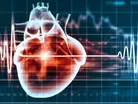Renal Denervation Trials Tirelessly Try to Improve Cardiac Health

Written by Alyssa Clark
As the success of the recent renal denervation trials goes up, patients’ blood pressure continues to go down— as much as 30 mm Hg down. This recently implemented catheter-based blood pressure lowering technology has consistently generated results that directly correlate with patients’ increase in heart health and longevity.
Eliminating the complications of relying on drug therapy for patients, this renal deneration is working its way up to being called the “cure” for resistant hypertension, Medical device companies and the cardiac community alike are both equally excited about the possibilities that come with this new wave of cardiac-health solutions, and the profitability of this technology as it continues to grow. The ability for this technology to be expanded into more moderate forms of hypertension and other disease is now actively being pursued by researches.
However, the most recent tests of this technology have produced much more realistic results changing that 30mm Hg reduction to a much more reasonable 11 mm Hg reduction.
Hypertension experts Franz Messerli and Sripal Bangalore agree that the hype over renal denervation is due for deflation, “Small wonder that the cookie is finally crumbling, bigger wonder that it actually took so long. The irrational exuberance for renal denervation in resistant hypertension was entirely driven by uncontrolled non-randomized observational office-based blood pressure studies. We showed that in the Spanish registry of more than 8000 patients about a quarter of patients with office blood pressures of above 160/100 were actually normotensive when monitored by 24-hour ambulatory blood pressure(ABPM ). Further, in this same Spanish registry about one third of patients with resistant hypertension based on office blood pressure measurements had normotensive ABPMs. Thus many patients with so-called resistant hypertension by office blood pressure measurements may be pseudo-resistant only. This would indicate that the exaggerated benefits observed with office blood pressure measurements are due to the simple fact that some patients actually had normal blood pressure at trial baseline. Conceivably many of these patients have white coat hypertension which is unmasked by ABPM”.
The senior author of the most recent paper about this change in reduction prediction is a man named Darrel Francis, he says “that the real effect of a 10-15 mm Hg drop in pressure ‘is very worthwhile, but talking about 2 or 3 times that effect size does nobody any good, because it eliminates the scope for scientific discussion’”.
Rest assured though that there is light at the end of the tunnel, and that this gap isn't truly as negative as it may be perceived. Wendy Dougherty, Director of Public Relations from Medtronic explains the disjunction in these numbers as: "There are many reasons why these two measures would be different. The reason for the lower ABPM is expected as BP is lower at night, so average BP will be less and the multiple readings give a different outcome (averaged SBP over 24 hours) rather that obtained by a single reading. Comparing Office Blood Pressure Monitoring and ABPM is an apples to oranges comparison - they report on different measurements and would not be expected to be the same. Also lost is the observation of a very consistent drop by ABPM that is being observed (~11 mm Hg) in the limited but growing RDN ABPM data that is available and that this is a very significant effect that should have very important and substantial clinical benefit".
Renal Denervation is a valuable tool, but is not approved by the FDA to be used in the U.S., with products available in Europe from Medtronic, St. Jude Medical, Boston Scientific, Coviden, Recor and Terumo. As stated earlier, tons of medical device companies are chomping at the bit to get in on the action concerning this new technology, it just seems to be some medical professionals are losing their heads about the realistic expectations of this technology; if we stay grounded in terms of our expectations and goals for this technology it can help the world in new and expanding ways.
About the Author
Alyssa Clark is the Editor of Healthcare Global



